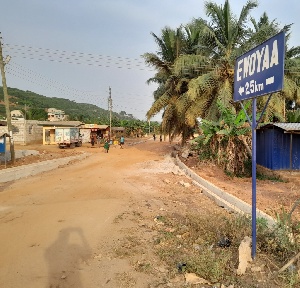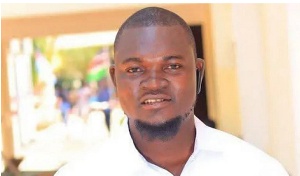- Home - Entertainment
- Lifestyle News
- Year In Review
- Music News
- Entertainers
- Entertainment Archive
- Entertainment Photos
- Jokes
- Entertainment Headlines
- Ameyaw Debrah
- Brown GH
- Celebrities Buzz
- GH Base
- Ghana Celebrities
- Gh Gossip
- GH Page
- GH Splash
- Hot Gossip GH
- YEN
Television of Tuesday, 25 March 2025
Source: www.ghanawebbers.com
Lithium Boom: Inhabitants of Ghana’s lithium hotspot demand compensations
Stephen Mensah is a 90-year-old elder from Ewoyaa, Ghana. He has lived in this small community for nearly a century. Soon, he and 400 residents may lose their homes. This could happen if Ghana's legislators approve a mining deal.
The deal would allow Atlantic Lithium to extract lithium from Ewoyaa. Lithium is essential for electric vehicles and renewable energy. The Mining Lease Agreement is currently awaiting approval in Parliament.
If approved, the mining will displace the Ewoyaa people. They will leave behind their farms, medicinal plants, and wildlife habitats. Environmental loss is also a major concern.
Atlantic Lithium has already secured several permits for mining activities. These include a Mine Operating Permit and an Environmental Permit from the EPA. The company plans to extract resources from the Ochi-Amissah River.
During a recent visit to Ewoyaa, signs of change were evident. Buildings and structures have been marked for demolition by Atlantic Lithium. Residents have been warned against building or expanding their homes.
Mr. Mensah shared that they were told to stop construction due to the operating permit granted to Atlantic Lithium. He mentioned that discussions about mining activities have taken place with the company.
Residents feel stranded and uncertain about their future due to delays in compensation. There are no guarantees about where they will be resettled if displaced. Many young people are leaving for gold mining areas elsewhere in Ghana.
One resident expressed frustration over ongoing work by company employees despite parliamentary delays on the agreement ratification. They see workers digging every day but lack clarity on what’s happening.
Another resident described how officials counted crops and marked properties for compensation but have not followed through yet. They are still waiting for news on compensation payments.
It has been over three years of uncertainty for the community members regarding their situation. Another resident echoed feelings of confusion as company workers continue operations while they wait.
An elder noted that construction has been halted for two years now due to restrictions imposed by the company’s officials. This has prevented them from maintaining or expanding their homes.
Uncle Ebow shared his frustrations about being unable to finish his house because of these restrictions, leading him to waste his savings on unfinished work.
Life in Ewoyaa has come to a standstill; residents cannot build or farm effectively anymore. Hunting is also difficult as animals flee due to increased vehicle traffic in the area.
African Eye Report visited Atlantic Lithium’s office in Mankessim, where officials confirmed plans for relocation once production starts but could not specify new locations yet.
They explained that compensation payments are pending because discussions within the compensation committee are ongoing. This committee includes various stakeholders like traditional leaders and representatives from different organizations.
Experts warn that lithium mining can lead to severe environmental issues such as pollution and biodiversity loss. Denis Gyeyir from NRGI emphasized that proper consent processes must be followed before any relocation occurs.
He stressed that compensation should reflect the true value of lost land and livelihoods while ensuring access to essential services after resettlement takes place.
Concerns were raised about whether schools and other support systems would be available at new locations after relocation occurs, highlighting potential gaps in planning efforts by Atlantic Lithium.
Atlantic Lithium conducted an Environmental Impact Statement (EIS) as required by law but faced criticism over insufficient community engagement during this process.
Many residents struggle with understanding complex reports written in English rather than local languages, which hinders effective communication about impacts on their lives.
Ghana holds significant lithium reserves estimated at 180,000 tonnes, ranking fourth in Africa behind larger producers like Congo and Zimbabwe.
The Ewoyaa project could generate around $4.8 billion over its lifespan while providing Ghana with a 13% stake in profits through carried interest.
However, experts caution that refining processes may create additional toxic waste if not managed properly.
Atlantic Lithium continues lobbying government officials for quick ratification of its deal with meetings held recently with key ministers involved.
Company chair Neil Herbert expressed optimism about securing final approvals soon so they can move forward with investments into local infrastructure projects benefiting communities affected by mining operations.
Historically, resource-dependent economies like Ghana often fail to deliver meaningful benefits back into local communities affected by extraction activities—a trend seen across sub-Saharan Africa too.
For now though—the people of Ewoyaa remain anxious as they await decisions impacting both their rights—and futures—amidst this looming lithium boom opportunity ahead without clear assurances provided thus far regarding adequate compensations/resettlements promised earlier on!
Efforts made by African Eye Report seeking comments from government officials went unanswered regarding these developments reported here today!











